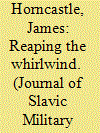| Srl | Item |
| 1 |
ID:
142606


|
|
|
|
|
| Summary/Abstract |
Croatia's successful bid for independence was one of the defining moments of the immediate post-Cold War period. Nevertheless, the means that Croatia used to obtain independence remains relatively unexamined by academics. This article focuses on the early period of Croatia's bid for secession, and specifically the role that Yugoslavia's policy of Total National Defence played in facilitating its independence. Unlike in Slovenia, where the legacies of Total National Defence facilitated Slovenia's bid for secession, in Croatia the decision of its political leaders meant that the country largely neglected its positive legacies, resulting in a protracted four-year struggle.
|
|
|
|
|
|
|
|
|
|
|
|
|
|
|
|
| 2 |
ID:
151700


|
|
|
|
|
| Summary/Abstract |
This article examines the role of the Macedonian Question in the 1944 December Uprising (Dekemvriana) in Greece. While the Dekemvriana is commonly portrayed in right–left terminology in the historiography, this article argues that part of the reason for the left’s failure was their inability to manage the Macedonian ethnic component of the struggle, either within their armed forces or in their relationship with Yugoslavia. As such, this article integrates the early phases of the Greek Civil War into the broader literature on minorities in civil conflict, while simultaneously exposing some of the myths about Macedonian involvement that result from its contemporary political ramifications.
|
|
|
|
|
|
|
|
|
|
|
|
|
|
|
|
| 3 |
ID:
124343


|
|
|
|
|
| Publication |
2013.
|
| Summary/Abstract |
On 25 June 1991 Slovenia declared independence from Yugoslavia. Most outside observers assumed that the federal army, the Yugoslav People's Army (YPA), would quickly reassert federal authority over Slovenia. Instead, Slovenia not only defeated the YPA, but would gain the initiative against the mechanically superior force. This article will argue that one of the principle reasons for Slovenia obtaining independence was that it benefited from the military heritage of the Yugoslav defense policy of Total National Defense (TND), whereas the YPA was largely inhibited by its legacies.
|
|
|
|
|
|
|
|
|
|
|
|
|
|
|
|
| 4 |
ID:
184084


|
|
|
|
|
| Summary/Abstract |
Whilst scholars have examined the long-term political, social, and cultural dynamics with regards to Yugoslavia’s collapse, the military has largely escaped similar scrutiny. This paper explores the League of Communists of Yugoslavia’s attempt to solve the nationalist problems of Yugoslavia through the ideology of self-management, and how the failure to do so affected the strategy of Total National Defence. The republics were able to construct their own armed forces due to Total National Defence’s devolution of powers and self-management making changes to the policy extremely difficult for the federal government and Yugoslav People’s Army.
|
|
|
|
|
|
|
|
|
|
|
|
|
|
|
|
| 5 |
ID:
193545


|
|
|
|
|
| Summary/Abstract |
The limited studies that focus on the weaponization of refugees typically emphasize how liberal democracies and states with restricted carrying capacity are vulnerable to this tactic. The declining number of liberal democracies globally, the Russian-Ukraine War demonstrating states’ true carrying capacities, and the tactic’s increasing prevalence, however, necessitate a closer examination of their causes. Technological and ideological developments, along with developments in warfare as a result of these changes, mean that the weaponization of refugees is likely to increase, not decrease, in the foreseeable future.
|
|
|
|
|
|
|
|
|
|
|
|
|
|
|
|